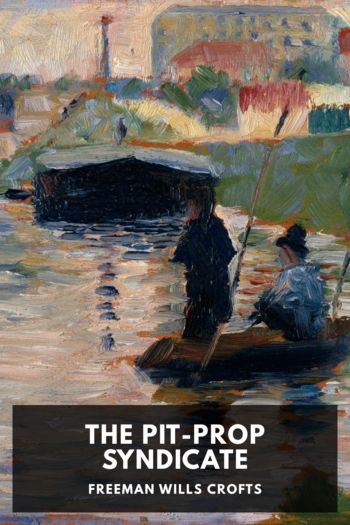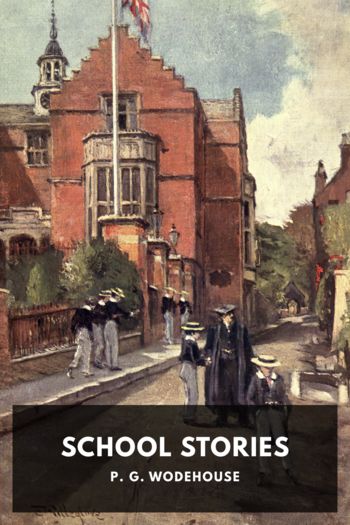Ukridge Stories by P. G. Wodehouse (best large ereader TXT) 📕

- Author: P. G. Wodehouse
Book online «Ukridge Stories by P. G. Wodehouse (best large ereader TXT) 📕». Author P. G. Wodehouse
By P. G. Wodehouse.
Table of Contents Titlepage Imprint Dedication Ukridge Stories Ukridge’s Dog College Ukridge’s Accident Syndicate The Début of Battling Billson First Aid for Dora The Return of Battling Billson Ukridge Sees Her Through No Wedding Bells for Him The Long Arm of Looney Coote The Exit of Battling Billson Ukridge Rounds a Nasty Corner A Bit of Luck for Mabel Buttercup Day The Level Business Head Colophon Uncopyright ImprintThis ebook is the product of many hours of hard work by volunteers for Standard Ebooks, and builds on the hard work of other literature lovers made possible by the public domain.
This particular ebook is based on a transcription produced for Project Gutenberg and on digital scans available at the Internet Archive and the HathiTrust Digital Library.
The writing and artwork within are believed to be in the U.S. public domain, and Standard Ebooks releases this ebook edition under the terms in the CC0 1.0 Universal Public Domain Dedication. For full license information, see the Uncopyright at the end of this ebook.
Standard Ebooks is a volunteer-driven project that produces ebook editions of public domain literature using modern typography, technology, and editorial standards, and distributes them free of cost. You can download this and other ebooks carefully produced for true book lovers at standardebooks.org.
Dedicated with esteem and gratitude to
Old Bill Townend
my friend from boyhood’s days who first introduced me to Stanley Featherstonehaugh Ukridge
“Laddie,” said Stanley Featherstonehaugh Ukridge, that much-enduring man, helping himself to my tobacco and slipping the pouch absently into his pocket, “listen to me, you son of Belial.”
“What?” I said, retrieving the pouch.
“Do you want to make an enormous fortune?”
“I do.”
“Then write my biography. Bung it down on paper, and we’ll split the proceeds. I’ve been making a pretty close study of your stuff lately, old horse, and it’s all wrong. The trouble with you is that you don’t plumb the wellsprings of human nature and all that. You just think up some rotten yarn about some-dam-thing-or-other and shove it down. Now, if you tackled my life, you’d have something worth writing about. Pots of money in it, my boy—English serial rights and American serial rights and book rights, and dramatic rights and movie rights—well, you can take it from me that, at a conservative estimate, we should clean up at least fifty thousand pounds apiece.”
“As much as that?”
“Fully that. And listen, laddie, I’ll tell you what. You’re a good chap and we’ve been pals for years, so I’ll let you have my share of the English serial rights for a hundred pounds down.”
“What makes you think I’ve got a hundred pounds?”
“Well, then, I’ll make it my share of the English and American serial rights for fifty.”
“Your collar’s come off its stud.”
“How about my complete share of the whole dashed outfit for twenty-five?”
“Not for me, thanks.”
“Then I’ll tell you what, old horse,” said Ukridge, inspired. “Just lend me half a crown to be going on with.”
If the leading incidents of S. F. Ukridge’s disreputable career are to be given to the public—and not, as some might suggest, decently hushed up—I suppose I am the man to write them. Ukridge and I have been intimate since the days of school. Together we sported on the green, and when he was expelled no one missed him more than I. An unfortunate business, this expulsion. Ukridge’s generous spirit, ever ill-attuned to school rules, caused him eventually to break the solemnest of them all by sneaking out at night to try his skill at the coconut-shies of the local village fair; and his foresight in putting on scarlet whiskers and a false nose for the expedition was completely neutralised by the fact that he absentmindedly wore his school cap throughout the entire proceedings. He left the next morning, regretted by all.
After this there was a hiatus of some years in our friendship. I was at Cambridge, absorbing culture, and Ukridge, as far as I could gather from his rare letters and the reports of mutual acquaintances, flitting about the world like a snipe. Somebody met him in New York, just off a cattle-ship. Somebody else saw him in Buenos Aires. Somebody, again, spoke sadly of having been pounced on by him at Monte Carlo and touched for a fiver. It was not until I settled down in London that he came back into my life. We met in Piccadilly one day, and resumed our relations where they had been broken off. Old associations are strong, and the fact that he was about my build and so could wear my socks and shirts drew us very close together.
Then he disappeared again, and it was a month or more before I got news of him.
It was George Tupper who brought the news. George was head of the school in my last year, and he has fulfilled exactly the impeccable promise of those early days. He is in the Foreign Office, doing well and much respected. He has an earnest, pulpy heart and takes other people’s troubles very seriously. Often he had mourned to me like a father over Ukridge’s erratic progress through life, and now, as he spoke, he seemed to be filled with a solemn joy, as over a reformed prodigal.
“Have you heard about Ukridge?” said George Tupper. “He has settled down at last. Gone to live with an aunt of his who owns one of those big houses on Wimbledon Common. A very rich woman. I am delighted. It will be the making of the old chap.”
I suppose he was right in a way, but to me this tame subsidence into companionship with a rich aunt in Wimbledon seemed somehow an indecent, almost a tragic, end to a colourful career like that of S. F. Ukridge. And





Comments (0)